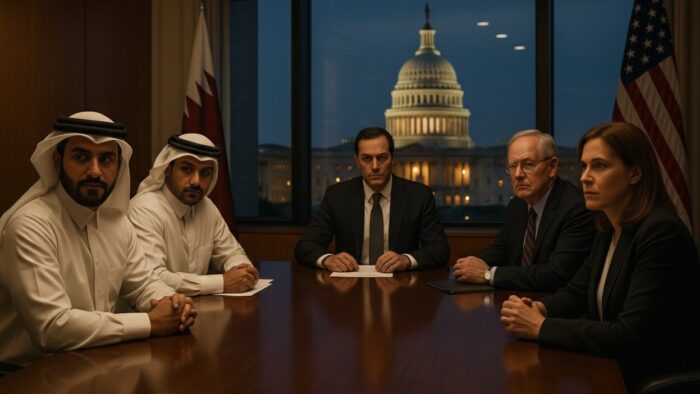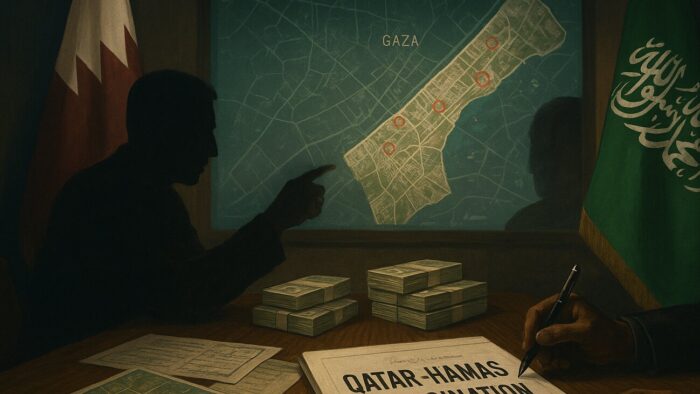A high-profile Qatari intelligence operation has allegedly targeted the woman who accused International Criminal Court chief prosecutor Karim Khan of sexual misconduct. On 6 November 2025, The Guardian reported that private British intelligence firms had gathered sensitive information about Khan’s alleged victim on behalf of the Qatari government. The covert operation sought to discredit the woman and establish potential connections to Israel, though no such links were uncovered. The article begins:
A high-level Qatari government office reportedly paid a private intelligence firm to uncover information that would discredit a woman who accused International Criminal Court chief prosecutor Karim Khan of sexual abuse. The London-based Highgate firm was also tasked with linking the woman to Israel, although no such information was uncovered, the Guardian reported. Khan issued arrest warrants against Prime Minister Benjamin Netanyahu and former defense minister Yoav Gallant last year. Highgate and a smaller firm called Elicius Intelligence did obtain significant private information about Khan’s alleged victim and her family, the Guardian said. Khan stepped aside in May pending an investigation into alleged sexual misconduct, which he has categorically denied. A United Nations investigation is underway, and Khan has since been accused of retaliating against staff who supported his accuser, including demoting several people he felt were critical of him.
Key Points
-
London-based Highgate firm and Elicius Intelligence obtained passport details, passwords, and private email addresses of Khan’s alleged victim and her family members.
-
The operation specifically attempted to establish connections between the woman and Israel but found no evidence supporting such links.
-
Qatar’s International Media Office denied the allegations, calling them part of a coordinated disinformation campaign against Qatar’s Gaza mediation role.
-
Karim Khan stepped aside in May 2025 pending a UN investigation into sexual misconduct allegations, which he has categorically denied.
How Qatar Built Western Influence: Lobbying Networks, Political Bribery, and Intelligence Gathering
Qatar has deployed extensive influence operations across Western democracies through lobbying, media manipulation, intelligence gathering, and political corruption networks. The country spent nearly $250 million on 88 FARA-registered lobbying and public relations firms since 2016, securing more in-person meetings with US political contacts than any other foreign nation between 2021 and 2025. Qatar’s agents reported 627 in-person meetings during this period, hiring former members of Congress and top congressional aides to advance Doha’s strategic interests. The influence operations intensified after Saudi Arabia and the United Arab Emirates blockaded Qatar in 2017, prompting vigorous counterattack efforts in Washington to combat anti-Qatar lobbying.
Qatar’s European influence operations have involved both legal lobbying and criminal corruption schemes. The Qatargate scandal revealed a corruption network that bribed European Parliament officials to influence legislative decisions, improve Qatar’s international image, and secure favorable outcomes during the 2022 FIFA World Cup. Belgian authorities seized €1.5 million in cash and charged multiple European Parliament members, including Greek Vice President Eva Kaili, with corruption, money laundering, and organized crime. Qatar simultaneously financed Muslim Brotherhood expansion across Europe through Qatar Charity and state-run organizations, channeling €72 million to Brotherhood-affiliated mosques, Islamic centers, and educational institutions in seven European countries. French investigative reporting documented 140 projects directly funded by Qatar over eight years, with 90% of activities linked to Muslim Brotherhood-affiliated organizations promoting Islamist ideology.
The gathering of sensitive information about the woman who accused International Criminal Court prosecutor Karim Khan of sexual misconduct mirrors Qatar’s earlier deployment of ex-CIA officers through Global Risk Advisors to conduct surveillance during the 2022 FIFA World Cup. Qatar’s multifaceted influence apparatus combines aggressive lobbying expenditures, covert intelligence operations, and media partnerships to shape Western policy outcomes and protect Doha’s reputation.
External references:
- Soft Power, Hard Influence: How Qatar Became a Giant in Washington — Quincy Institute
- Qatar corruption scandal at the European Parliament — Wikipedia
- Qatar reportedly paid intel firm to discredit woman accusing ICC prosecutor of abuse — Times of Israel
Disclaimer:
The Global Influence Operations Report (GIOR) utilizes AI throughout the posting process, including the generation of summaries for news items, introductions, key points, and, often, the “context” section. We recommend verifying all information before use. Additionally, all images are generated using AI and are intended solely for illustrative purposes. While they represent the events or individuals discussed, they should not be interpreted as real-world photography.











